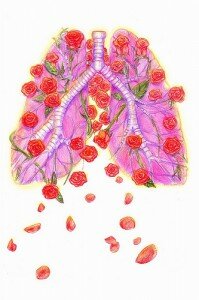 In this week’s Nature Genetics there is a genome-wide association study of lung disease severity in cystic fibrosis suffers (or at least the subset who carry the ΔF508 mutation). The authors report a number of variants with “suggestive evidence”, and one with genome-wide significant evidence . The one genome-wide significant variant is rs12793173, with the C allele increasing the severity of lung disease. The variant is downstream of the gene EHF, which is also believed to play a role in asthma; the hope is that the function of this gene may shed some light on what causes variation in CF severity. As a CF mutation carrier with a CC genotype, any children that I have would be at a at slightly increased of having worse lung function. However, the variant only explains 1-2% of variation in lung function, so I won’t be worrying too much. [LJ]
In this week’s Nature Genetics there is a genome-wide association study of lung disease severity in cystic fibrosis suffers (or at least the subset who carry the ΔF508 mutation). The authors report a number of variants with “suggestive evidence”, and one with genome-wide significant evidence . The one genome-wide significant variant is rs12793173, with the C allele increasing the severity of lung disease. The variant is downstream of the gene EHF, which is also believed to play a role in asthma; the hope is that the function of this gene may shed some light on what causes variation in CF severity. As a CF mutation carrier with a CC genotype, any children that I have would be at a at slightly increased of having worse lung function. However, the variant only explains 1-2% of variation in lung function, so I won’t be worrying too much. [LJ]
A reader got in touch with us to inform of research he is doing into the response of personal genomics customers to genetic information. He is looking for users and potential users of DTC genetic tests to fill out a survey; you can find the survey here. If you have the time, this would be worth doing. Arguments about DTC genetics are too often based on hypotheticals or guesses, but there is a rapidly growing field that looks at how individuals really response to genetic data. This sort of data is exactly what is needed to make sensible decisions about the impact of DTC genetics on society. [LJ]
Continuing her series of interviews with people who have taken genetic tests, Elaine Westwick interviewed Jane Gregory, the mother of a child with a complex developmental disorder that was finally diagnosed by a genetic test. The interview raises a lot of the classical issues that you often see in clinical genetics cases, including the power of finding a genetic cause, even when knowing the cause doesn’t add any new treatment options. Well worth reading. [LJ]
The image at the top of the post, “65 Roses”, was made by Tanya Dawn








 RSS
RSS Twitter
Twitter
The power of a genetic diagnosis, like the power of all diagnoses, can be, should be proportionately profound. Hangnails, meh. But blackwater fever, serious news. Nosology, the art of naming afflictions, is as ancient as … well … afflictions. If you get the science and the art right, great value. Genetic tests, and those wield them, have been contributing their chapter to this now thick tome for several decades. The concept is not new, though in some ways the miracle of truth is never old.